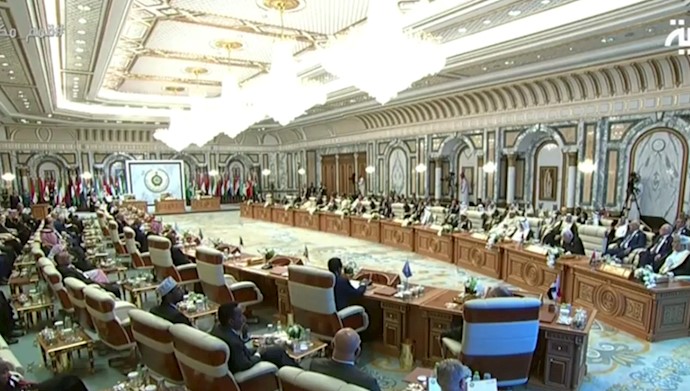Analysis by PMOI/MEK
Iran, May 31, 2019 – Leaders of numerous Arab states and members of the Gulf Cooperation Council (GCC) held two summits in Mecca on Thursday discussing recent attacks carried out by the regime ruling Iran and its proxy groups targeting oil tankers and vital oil facilities.
The final statements issued after two conferences strongly condemning attacks by Tehran’s surrogates targeting Saudi oil facilities and oil tankers off the coast of the United Arab Emirates, parallel to other Tehran destructive policies across the region. The statement also emphasized the solidarity among Arab states in the face of Iranian regime meddling. Arab states are also calling on the international community to take firm action against Tehran’s warmongering policies.
GCC members expressed their full support of Saudi Arabia and the UAE in taking any action necessary to defend their security following the recent attacks. The six GCC members discussed a joint defensive mechanism as an alliance to take action in such circumstances.
The GCC Summit final statement condemned the Iran-backed Houthi militias’ attack on oil pump stations in Saudi Arabia and a sabotage attack targeting four commercial ships off the UAE coast. The statement also calls on the international community to prevent the mullahs’ regime in Iran from obtaining nuclear capabilities. The text also calls on Tehran to stop providing financial support for “militias” and “terrorist organizations.”
King Salman of Saudi Arabia, Egyptian President Abdel Fattah, King Abdullah of Jordan and the Emir of Kuwait all expressed grave concerns over recent tensions across the region and called for a firm international response to the Iranian regime’s policies. Numerous Arab leaders also condemned Tehran for its support of terrorist activities throughout the Middle East and emphasized on the Arab countries’ solidarity in the face of such threats.
The Arab leaders’ summit condemned the Iranian regime’s meddling in the internal affairs of regional countries and stressed on the Arab World’s solidarity in confronting these policies. This statement condemned terrorist attacks targeting international shipping lines, Tehran’s meddling in Syria and the mullahs’ support for terrorist groups. The statement went on to condemn the Iranian regime’s launching of ballistic missiles against Saudi cities.
The regime in Iran is considered a major threat, especially to global energy.
The Middle East plays a vital role in global energy. More than two-thirds of the world’s oil reserves, one-third of gas reserves, and more than 30% of fossil energy is produced in the Middle East.
150 oil fields account for half of the world’s oil production, most of which are located in the Middle East.
The Ghawar oil field in Saudi Arabia alone has yielded 62 billion barrels of oil and has billions more to produce.
59 million oil barrels are transferred through maritime routes every day. The Strait of Hormuz ranks at the top with 18.5 million bpd.
On numerous occasions, the Iranian regime has threatened the security of the world's energy production through the creation of crises.
Iran's political and military officials have repeatedly threatened to destroy Saudi Arabia and other Gulf countries.
On March 22, 2018, Iran-backed Houthis in Yemen attacked Saudi oil installations using Iran-made "Badr" missiles. On March 30, 2018, a similar attack was launched with the same type of missiles.
Enjoying the Tehran’s military and arms support, Houthis attacked Saudi Aramco oil installations in the Jizan region using Iran-made missiles.
On July 19, 2018, Houthis used drones supplied by Iran to attack a Riyadh refinery in Saudi Arabia. Houthis have launched more than 195 missiles at Saudi Arabia and its oil installations so far. Continuation of this trend can endanger energy production across the world.
Iranian officials, including its president Hassan Rouhani, have threatened to block the Strait of Hormuz, triggering statements by other nations. Egyptian President Abdel Fattah el-Sisi said, "If the security of the Persian Gulf is endangered, Egypt will intervene militarily."
The regime's actions can be extremely harmful to the security of global energy, which in turn will have serious ramifications for the world economy.





